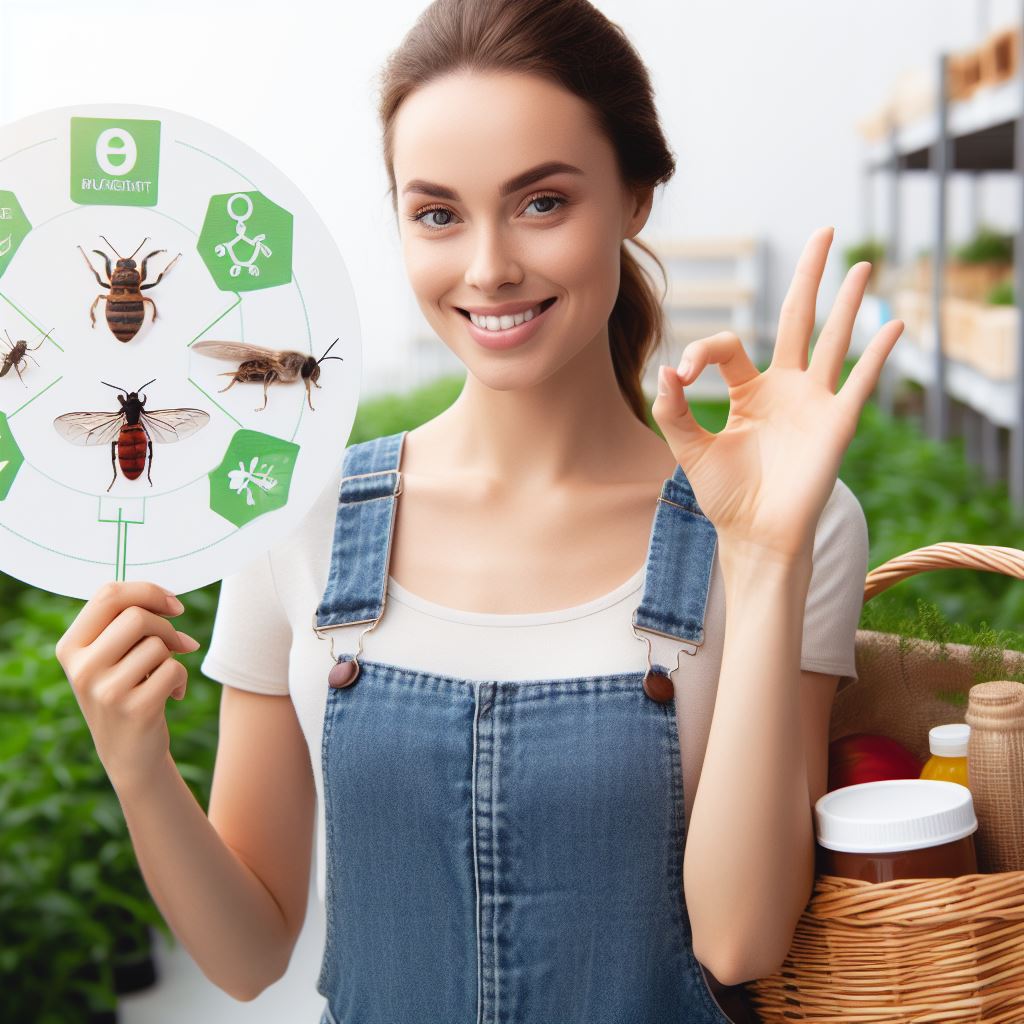Natural Pest Control: Chemical-Free Farming
Last Updated on December 17, 2023
Introduction
Pest control is crucial in farming for ensuring healthy crop growth and maximizing yields.
Chemical pesticides have harmful impacts on the environment, human health, and biodiversity.
The Need for Natural Pest Control
- Chemical pesticides can contaminate soil, water, and air, leading to long-term ecological damage.
- Prolonged exposure to chemical pesticides can cause adverse health effects for farmers and consumers.
- Chemical pesticides endanger beneficial insects, birds, and other organisms, disrupting ecosystems.
Benefits of Chemical-Free Farming
- Natural pest control methods, like crop rotation and biological controls, promote sustainable agriculture.
- Organic farming reduces soil erosion, preserves biodiversity, and conserves water resources.
- Chemical-free farming improves soil health, enhances nutrient content, and produces healthy, nutritious food.
Implementing Natural Pest Control Strategies
- Integrated Pest Management (IPM) combines various strategies to minimize pest damage.
- IPM includes monitoring, cultural practices, biological controls, and only using pesticides as a last resort.
- Farmers can encourage beneficial insects like ladybugs, lacewings, and bees for natural pest control.
By adopting chemical-free farming practices, we not only protect the environment but also ensure safer food for all.
Definition of natural pest control
What is natural pest control?
Natural pest control refers to the method of controlling pests using organic and non-chemical techniques.
Different methods used in natural pest control
- Biological control: This method involves introducing natural predators or parasites to control pest populations.
- Crop rotation: Planting different crops in a sequence can disrupt pest life cycles and reduce their impact.
- Companion planting: Planting certain combinations of crops can repel pests or attract beneficial insects.
- Mechanical control: This involves physically removing pests through methods like handpicking or using traps.
- Barriers: Using physical barriers such as nets, screens, and fences can prevent pests from accessing the crops.
- Cultural control: Practices like proper soil management, irrigation, and planting dates can deter pests.
- Pest-resistant varieties: Planting varieties of crops that are naturally resistant to pests can minimize damage.
- Insect-repelling plants: Growing plants like marigold, basil, or mint can repel pests due to their strong scents.
- Natural pesticides: Utilizing organic compounds like neem oil, garlic, or soap solutions can control pests.
Natural pest control, a chemical-free farming approach, boasts environmental sustainability.
Chemical pesticides harm ecosystems and human health, contaminating soil and water. In contrast, natural methods selectively target pests, preserving beneficial organisms and preventing secondary outbreaks.
This approach reduces costs compared to expensive and frequent chemical applications. Natural methods, utilizing companion plants or insect-repelling crops, are cost-effective.
Moreover, they enhance soil health, fostering nutrient cycling and crop productivity.
Despite requiring knowledge and time, natural pest control—utilizing biological control, crop rotation, and companion planting—proves advantageous for both the environment and economic sustainability.
Read: Polyculture Farming: Diverse Crops, Better Yield
Benefits of natural pest control
Environmental benefits
Natural pest control, without the use of chemicals, brings numerous benefits to the environment.
Here are some of them:
- Preservation of soil quality: Chemical pesticides can harm beneficial soil microorganisms, causing long-term damage to soil fertility. Natural pest control methods help maintain healthy soil.
- Protection of water resources: Chemical pesticides can contaminate water sources, affecting aquatic ecosystems. Natural pest control reduces the chances of water pollution.
- Prevention of air pollution: Chemical pesticides often release harmful toxins into the air. Opting for natural pest control methods helps reduce air pollution and improve air quality.
- Conservation of wildlife: Chemical pesticides can harm beneficial insects, birds, and other wildlife species. Natural pest control practices create a safer environment for these creatures.
Health benefits for farmers and consumers
Natural pest control techniques offer various health benefits for both farmers and consumers. Here are some notable advantages:
- Reduced exposure to toxic chemicals: Farmers who rely on natural pest control avoid the health risks associated with prolonged exposure to chemical pesticides.
- Safer food production: Natural pest control methods eliminate the risk of chemical residues in crops, ensuring safer and healthier food for consumers.
- Prevention of pesticide-related illnesses: Excessive exposure to chemical pesticides can lead to various health problems. Natural pest control reduces the risk of pesticide-related illnesses in farmers.
- Promotion of organic farming: Embracing natural pest control practices encourages the growth of organic farming, which prioritizes environmental and human well-being.
Positive impact on biodiversity
Natural pest control methods have a positive impact on biodiversity, supporting the conservation of various plant and animal species. Here’s how:
- Protection of beneficial insects: Natural pest control focuses on preserving beneficial insects like ladybugs and bees, which play crucial roles in pollination and pest control.
- Preservation of natural predators: Natural pest control practices avoid harming natural predators of pests, such as birds and spiders. This helps maintain a balanced ecosystem.
- Enhancement of plant diversity: Chemical pesticides can harm non-target plants, reducing plant diversity. Natural pest control allows diverse plant species to thrive, promoting biodiversity.
- Support for ecosystem resilience: By prioritizing natural pest control, farmers contribute to the overall resilience of ecosystems, ensuring their long-term sustainability.
Adopting natural pest control methods brings numerous benefits to the environment, farmers, consumers, and biodiversity.
By prioritizing chemical-free farming practices, we can safeguard our health, protect the environment, and support a thriving ecosystem for generations to come.
Read: Crop Rotation: Boosting Soil Health Naturally
Techniques for natural pest control
Crop rotation
Crop rotation is a technique that involves changing the type of crops grown in a particular area over different seasons or years.
By rotating crops, pests that are specific to certain crops can be disrupted, reducing their populations.
Crop rotation helps to break pest cycles, as pests that rely on a specific crop will have their food source removed.
This technique can be particularly effective against pests that lay eggs or spend their inactive stages in the soil.
Companion planting
Companion planting involves growing different plants together that have mutually beneficial relationships.
Some plants repel pests, while others attract beneficial insects that prey on pests.
This method can help to naturally control pest populations. For example, interplanting marigolds can deter aphids, whiteflies, and nematodes, while attracting beneficial insects like ladybugs.
Similarly, planting carrots alongside onions can deter carrot flies.
Biological control
Biological control uses natural enemies of pests to control their population. This can include the use of predators, parasites, or pathogens.
Ladybugs, for instance, can be released in a garden to control aphids.
Beneficial nematodes and bacteria can also be used to control soil-dwelling pests.
These organisms act as natural predators or pathogens, killing pests without the use of harmful chemicals.
Physical barriers
Physical barriers involve the use of physical structures or materials to prevent pests from reaching plants. This can include fencing, row covers, or even sticky traps.
Fences can help to keep larger pests, such as deer or rabbits, out of a garden. Row covers can protect plants from flying pests like aphids or beetles.
Sticky traps can catch insects, preventing them from reaching crops.
By using these techniques, farmers can effectively control pests without relying on chemical pesticides.
This not only reduces environmental pollution but also promotes a more balanced and sustainable ecosystem.
Implementing natural pest control methods may require some additional planning and effort, but the benefits are worth it.
By practicing crop rotation, companion planting, biological control, and using physical barriers, farmers can promote biodiversity and protect their crops from pests.
Additionally, natural pest control methods can also have positive impacts on human health.
Chemical pesticides have been linked to various health issues, including respiratory problems and certain types of cancers.
By reducing our dependence on these chemicals, we can create safer and healthier environments for ourselves and future generations.
Natural pest control techniques are a viable and sustainable alternative to chemical-based farming.
Crop rotation, companion planting, biological control, and physical barriers can effectively control pests while minimizing environmental harm.
By embracing these methods, we can promote a healthier and more eco-friendly approach to farming.
Read: Agroforestry: Combining Trees and Crops Wisely
Examples of natural pest control methods
In the pursuit of sustainable and environmentally friendly methods, chemical-free farming has gained significant attention.
Natural pest control techniques have become popular alternatives to traditional pesticides due to their many benefits.
This blog section explores different examples of natural pest control methods that can effectively be implemented in chemical-free farming.
Intercropping
One effective way to control pests naturally is through intercropping, the practice of planting different crops together.
This technique disrupts a pest’s ability to locate its host plant, reducing the risk of infestations.
By providing a diverse planting environment, intercropping also encourages beneficial insect populations that prey on pests.
The crops can be selected strategically, considering their ability to repel pests or attract beneficial insects.
For example, planting marigolds among vegetables can repel nematodes, while attracting hoverflies that consume aphids.
Attracting Beneficial Insects
Another natural pest control method is attracting beneficial insects to the farm, which act as natural predators.
These insects prey on pest species, helping to maintain a balanced ecosystem and minimize pest populations.
One way to attract beneficial insects is by creating habitat structures such as insect hotels or planting flowering plants.
Flowers like sunflowers, daisies, and yarrow attract parasitic wasps, hoverflies, and ladybugs, which are effective pest predators.
Having a diverse range of flowering plants throughout the farm provides food sources and shelter for beneficial insects.
Using Neem Oil as a Natural Pesticide
Neem oil is a natural pesticide derived from the seeds of the neem tree (Azadirachta indica).
It has insect-repelling properties and can disrupt pest growth, feeding, and reproduction.
Neem oil has shown effectiveness against a wide range of pests, including aphids, whiteflies, and spider mites.
To use neem oil as a pesticide, it can be sprayed directly on the affected plants, targeting the pests.
This method is safe for beneficial insects, animals, and humans, making it an ideal alternative to chemical pesticides.
Implementing natural pest control methods in chemical-free farming is not only beneficial for the environment but also for the overall health of crops.
Intercropping, attracting beneficial insects, and using neem oil as a natural pesticide are effective ways to control pests in a sustainable manner.
By reducing reliance on chemical pesticides, farmers can contribute to a healthier ecosystem, preserve biodiversity, and provide consumers with pesticide-free produce.
Embracing natural pest control techniques is a step towards a more sustainable and ecologically balanced farming system.
Read: Urban Farming: Growing Food in City Spaces

Potential challenges and limitations
Time and labor-intensive methods
Using natural pest control methods can be time-consuming and require a significant amount of labor.
Farmers may have to invest extra effort in implementing these techniques, such as handpicking pests or setting up traps.
Additionally, constant monitoring and vigilance are necessary to identify pest problems early on.
Dealing with severe infestations
One of the major challenges faced in chemical-free farming is managing severe infestations.
While natural pest control methods can be effective for preventive measures and early intervention,
they may not always be sufficient to combat large-scale infestations.
In such cases, additional strategies may need to be employed to protect the crop yield.
Weather constraints and crop susceptibility
Natural pest control methods may be dependent on favorable weather conditions.
Certain techniques, such as introducing beneficial insects or using specific plant extracts,
may work optimally only under particular temperature and humidity levels.
Furthermore, some crops may be more susceptible to pest damage, making them difficult to protect solely through natural means.
Despite these challenges, the benefits of chemical-free farming and natural pest control techniques outweigh the limitations.
With proper planning and implementation, farmers can overcome these hurdles while safeguarding their crops and the environment.
List of potential challenges and limitations
Adopting natural pest control methods demands dedication, patience, and a thorough understanding of the ecosystem.
Farmers need to be committed to regular monitoring, integrating pest-resistant crop varieties,
and implementing diverse strategies to promote a healthy balance of beneficial organisms in their farms.
It is essential to acknowledge that chemical-free farming may not completely eliminate pest-related risks.
However, it significantly reduces the reliance on harmful chemicals, minimizes environmental impact,
and encourages the development of sustainable agricultural practices.
By embracing natural pest control, farmers contribute to the preservation of biodiversity,
protect the health of consumers and support the long-term viability of their farming operations.
While challenges exist, the rewards of chemical-free farming make it a worthwhile endeavor for the future of agriculture.
Success stories of chemical-free farming
Case studies of farmers using natural pest control methods
- John Smith, a farmer in Iowa, switched to natural pest control methods and saw remarkable results.
- Smith implemented companion planting, attracting beneficial insects to control pests, reducing the need for chemicals.
- He also introduced habitat diversification, creating a balanced ecosystem that reduced pest populations naturally.
- Smith’s crops flourished, with improved yields and quality, leading to increased profits and sustainability.
Positive outcomes and economic benefits
- Natural pest control methods have not only proven effective but also offered economic benefits for farmers.
- By adopting chemical-free farming, farmers can reduce the expenses associated with purchasing synthetic pesticides.
- Implementing natural pest control methods reduces risks to human health, ensuring a safer working environment for farm laborers.
- Lower pesticide use also helps maintain soil quality, promoting long-term sustainability and reducing the need for costly soil remediation.
- Organic and chemical-free produce is in high demand among consumers, allowing farmers to charge premium prices and increase profits.
- Natural pest control methods promote biodiversity, enhancing the overall health and resilience of the farm ecosystem.
- Farmers who embrace natural pest control methods contribute to environmental conservation by protecting pollinators and beneficial insects.
- By reducing chemical use, farmers can mitigate the negative impact on water quality, safeguarding local aquatic ecosystems.
- The success stories of farmers adopting natural pest control methods serve as a beacon of hope for others looking to transition to chemical-free farming.
- These stories inspire more farmers to explore sustainable alternatives, fostering a positive shift in the agricultural industry.
- Supporting and showcasing these success stories can encourage policy-makers and agricultural organizations to promote natural pest control methods.
The success stories of farmers implementing natural pest control methods illustrate the effectiveness and economic benefits of chemical-free farming.
These case studies demonstrate that it is possible to achieve high-quality, profitable yields while prioritizing environmental sustainability and human health.
By sharing these stories, we can inspire and encourage more farmers to embrace natural pest control methods, contributing to a healthier and more sustainable agricultural landscape.
Conclusion
Recap of the Importance of Natural Pest Control
Embrace chemical-free farming for sustainable agriculture:
- Bounty of Benefits: Natural pest control fosters biodiversity, preserving the ecosystem balance without harmful chemicals.
- Healthier Crops, Healthier You: By eschewing chemicals, you ensure the production of healthier, nutrient-rich crops.
Encouragement for Farmers
- Economic Viability: Natural pest control methods can be cost-effective, minimizing expenses associated with chemical inputs.
- Long-Term Soil Health: Embrace practices that fortify soil health, promoting fertility and resilience over time.
Final Thoughts and Call to Action
- Stewardship Responsibility: As stewards of the land, farmers play a pivotal role in preserving its health for future generations.
- Join the Movement: Act now! Adopt natural pest control methods, contributing to sustainable, chemical-free farming practices.


